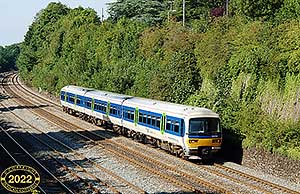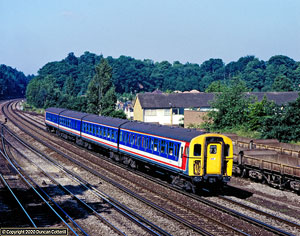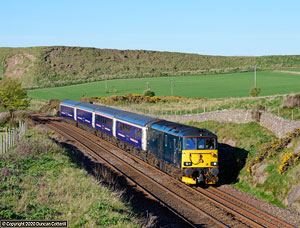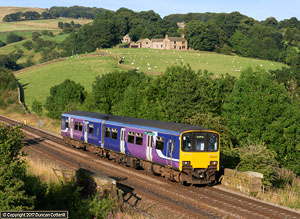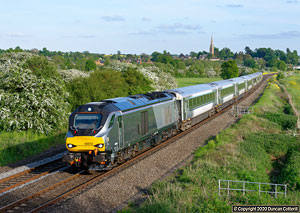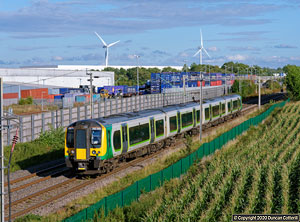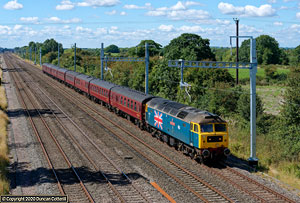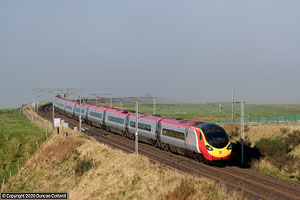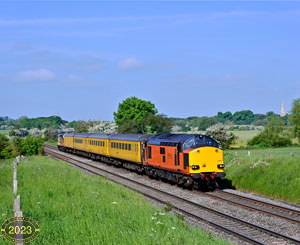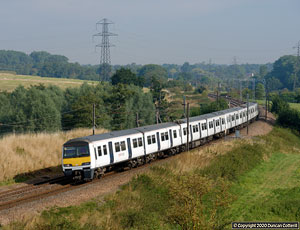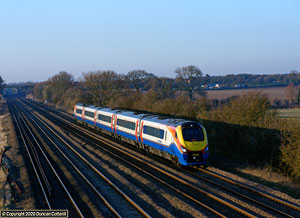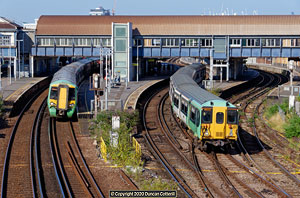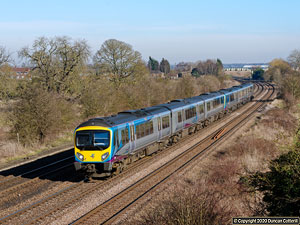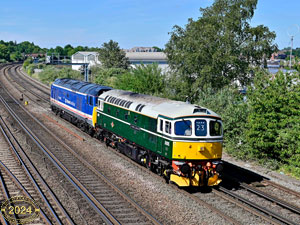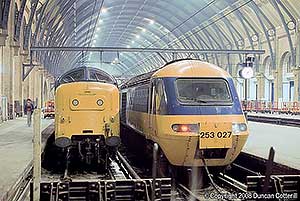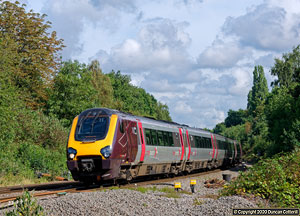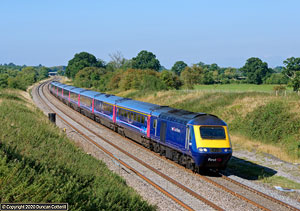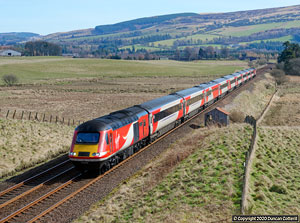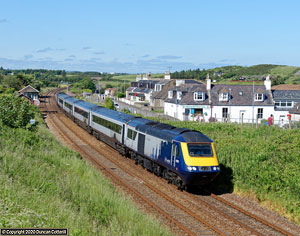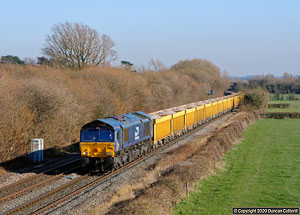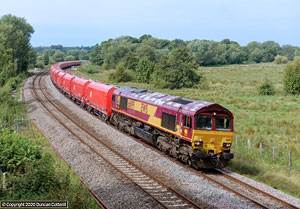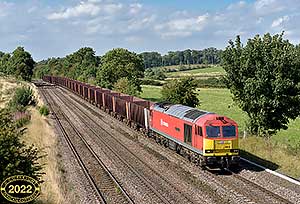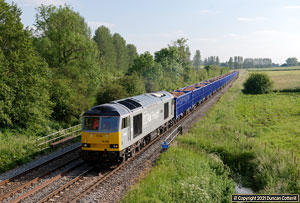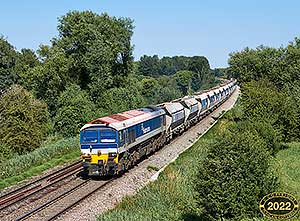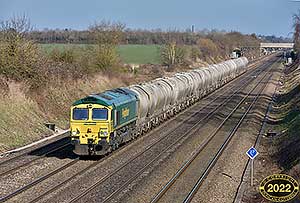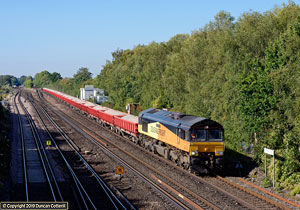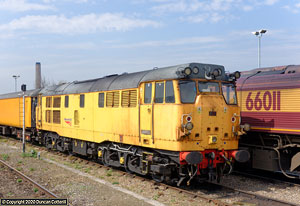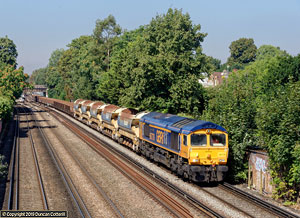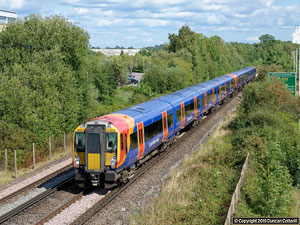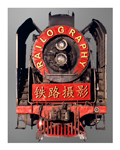Thames Trains
7 photos
updated : 2019-09-29
Thames Trains won the franchise to operate local passenger services in the Thames Valley and related routes from 1996 using a fleet of class 165 and 166 DMUs. In 2004 the Thames franchise was combined with the Great Western contract and Thames Trains ceased to exist as an operator.
Network South East
42 photos
updated : 2020-06-18
Network South East was part of British Rail, set up to operate local and regional passenger services in the London area and the south east of England. NSE existed from 1982 until the run-up to privatisation in the late-1990s and operated a variety of locos and multiple units.
Caledonian Sleeper
17 photos
updated : 2023-04-16
Anglo-Scottish sleepers are operated by a Scottish Government agency but worked by GBRf locos. Class 92 electrics work south of Glasgow and Edinburgh, with Class 73/9 electro-diesels working north to Aberdeen, Inverness and Fort William. New Mk V coaches were introduced in 2019.
Northern
6 photos
updated : 2023-08-11
Northern Trains operates local and some regional services over a large area of northern England, from Northumberland to Nottingham and Carlisle to Crewe, including the cities of Lancashire and Yorkshire. It operates a wide variety of DMU and EMU classes including several types that are unique to Northern.
Chiltern Railways
26 photos
updated : 2023-08-31
Chiltern Railways operates passenger services from London's Marylebone to the north-west suburbs and beyond to Oxford and the West Midlands. Most trains are worked by DMUs, some of them classes unique to Chiltern, but a few trains are operated by hired DRS Class 68 diesels on push-pull sets.
London Northwestern
24 photos
updated : 2023-10-20
London Northwestern operates outer suburban and long distance services on the West Coast Main Line between London, the West Midlands, Crewe and Liverpool and is actually part of West Midlands Trains. Almost all services are operated with Siemens built 4-car Class 350 EMUs.
West Coast Railway Co
7 photos
updated : 2024-01-20
West Coast Railway Company is a Carnforth based charter train operator with its own fleet of coaches and a sizeable roster of ex-BR steam and diesel locomotives. WCRC operates special trains across the network itself and also runs them on behalf of other tour promoters.
Virgin / Avanti West Coast
54 photos
updated : 2024-01-20
Virgin Trains operated long distance services on the West Coast Main Line, linking London with the West Midlands, North West England and Scotland, from privatisation in 1997 until late 2019 when the franchise, complete with its Class 221 DMUs and Class 390 EMUs, passed to Avanti West Coast.
Harry Needle Railroad Co
5 photos
updated : 2024-01-28
HNRC is the owner of a sizeable fleet of older locomotives which it hires out. Some are main line certified while others act as industrial or depot shunters. The operational fleet changes frequently with a number of Class 20, 37 and 47 being on the company's books as this is written in summer 2023.
Greater Anglia
33 photos
updated : 2024-01-28
Greater Anglia operates most passenger services in East Anglia and on several outer-suburban routes from London Liverpool St. The vast majority of GA trains are EMUs but some services were hauled by Class 37 diesels or Class 90 electric locos until late 2019 and early 2020 respectively.
East Midlands Railway
27 photos
updated : 2024-01-28
East Midlands Trains operated Midland Main Line passengers and associated local services until 2019, when the franchise was awarded to East Midlands Railway. Both companies' trains will appear here. All services have been worked by DMUs since the last HSTs were retired in late 2020.
Southern
23 photos
updated : 2024-02-01
Southern operates passenger services on the former Central division of the Southern Region, centred around the electrified lines from London to Brighton and various south coast destinations. It also operates an extensive electric suburban network in South London and local services along the south coast.
Trans Pennine Express
24 photos
updated : 2024-02-02
Trans Pennine Express operates long distance passenger services across the Pennines, linking the cities of Lancashire with Yorkshire, the Humber and North East England. Its trains also operate from Liverpool and Manchester via the ECML to Edinburgh and via the WCML to Glasgow and Edinburgh.
Miscellaneous Operators
7 photos
updated : 2024-02-03
This gallery covers organisations other than the usual passenger and freight companies or the two big mainline railtour operators. Most of these will be preservation groups but other operators that aren't well enough represented to justify having their own galleries may also be included here.
British Rail
123 photos
updated : 2024-02-09
British Railways, later British Rail, was the national operator from 1948 until privatisation in the late 1990s. Most images here are from the "corporate blue" era, which ended with sectorisation in 1982, as well as later photos featuring liveries from that era. Post-sectorisation liveries will be covered elsewhere.
Cross Country
53 photos
updated : 2024-02-19
The Cross Country franchise operates a number of medium and long-distance services via Birmingham, none of which serve London. Most trains are worked by Class 220 or 221 DEMUs. A fleet of Class 170 DMUs covers secondary routes and there were HSTs and loco hauled trains in the past.
Great Western
230 photos
updated : 2024-02-20
Great Western was one of the first privatised passenger franchises, created in 1996 to operate former Western Region InterCity services. It has since expanded to run other services in the same general area, including the Cardiff - Portsmouth route and local services in the Thames Valley and West Country.
East Coast
48 photos
updated : 2024-02-21
The East Coast franchise, covering trains from London to Newcastle, Edinburgh and Leeds, has changed hands several times since privatisation but the motive power, Class 91s and HSTs, remained the same until 2019, when the Class 800 and 801 IETs replaced all the HSTs and many 91s.
ScotRail
156 photos
updated : 2024-02-21
ScotRail operates almost all passenger services that run entirely within Scotland. The operator has a large fleet of EMUs and DMUs, which operate most services, but has recently acquired a number of shortened HST sets for use on services linking Glasgow and Edinburgh with Aberdeen and Inverness.
Direct Rail Services
67 photos
updated : 2024-02-21
Direct Rail Services was formed by BNFL to move nuclear flasks between power stations and the Sellafield reprocessing plant in Cumbria. It has since diversified into other freight markets. Most trains are operated by Class 66,68 and 88 locos but a few Class 37 and 57 remain in service.
English Welsh &Scottish Railway
171 photos
updated : 2024-02-23
EWS bought 5 of the 6 ex-BR freight operations at privatisation in the late 1990s, becoming the largest rail freight operator by far. It then introduced the Class 66 to replace most of the ex-BR locos. DB bought EWS in 2009. This gallery covers both the EWS era and EWS liveried locos in later years.
DB Cargo
406 photos
updated : 2024-02-23
EWS, the UKs largest freight operator, was taken over by Deutsche Bahn in late 2007, becoming DB Schenker and later DB Cargo. DBC uses around 180 Class 66 diesels on all types of freight traffic. It has small fleet of Class 67s and 92s but no longer uses Class 60 diesels or Class 90 electrics.
DC Rail
15 photos
updated : 2024-02-27
DC Rail (Devon and Cornwall Railways) has been operating freight services since 2011 and currently uses a small fleet of 2 Class 56 and 4 Class 60 diesels, mainly on aggregates traffic for its parent company, Cappagh Group. It has recently acquired more Class 60s although none are yet in service.
Mendip Rail
149 photos
updated : 2024-02-27
The rail operations of Foster Yeoman and Hanson (formerly ARC) were combined as Mendip Rail in 1993. Their 8 class 59 locomotives continue to haul stone trains from Merehead and Whatley quarries to various destinations in southern England but are now owned and operated by Freightliner.
Freightliner
409 photos
updated : 2024-02-29
BR's intermodal activities were privatised in 1996 and retained the Freightliner name. The company has since expanded to become the UK's largest freight operator. The loco fleet consists largely of Class 66 diesels but there are also Class 70 diesels and Class 90 electrics.
Colas Rail
87 photos
updated : 2024-02-29
Colas Rail is a major French railway infrastructure maintenance company that also runs freight and departmental trains across the network. Its core fleet consists of Class 56, 66 and 70 diesels and it uses classes 37 and 43 (and GBRf Class 73) on test trains operated on behalf of Network Rail.
Network Rail
128 photos
updated : 2024-02-29
Network Rail owns and operates the rail network (the infrastructure as opposed to the trains) and was formed in 2002 after the collapse of Railtrack. It owns a wide variety of rolling stock used to test and maintain the infrastructure, including a few locomotives, but freight operators provide the power for most trains.
GB Railfreight
232 photos
updated : 2024-02-29
GB Railfreight is the most successful of the new freight companies created since privatisation and is still growing. It currently operates a fleet of well over 100 locomotives from a variety of classes including Class 47, 57, 66 and 69 diesels, Class 73 electro-diesels and Class 92 electrics.
South Western
186 photos
updated : 2024-02-29
South West Trains operated suburban and long distance services from London Waterloo to the south and west from 1996 to 2017, when South Western Railway took over. Both are covered here. The franchise operates a large fleet of 750V DC 3rd rail EMUs but also uses DMUs on a few routes.
My home country where I've been photographing trains since the late 1970s. Only a small fraction of my British material is online at present but it covers a wide range of loco classes, train types and photo locations, from northern Scotland to the south coast of England and from Deltics to DMUs.
Britain's railways are far less interesting than they were a few decades ago but despite the decline it is still possible to find trains and locations that are worth photographing.




 options
options hide options panel
hide options panel